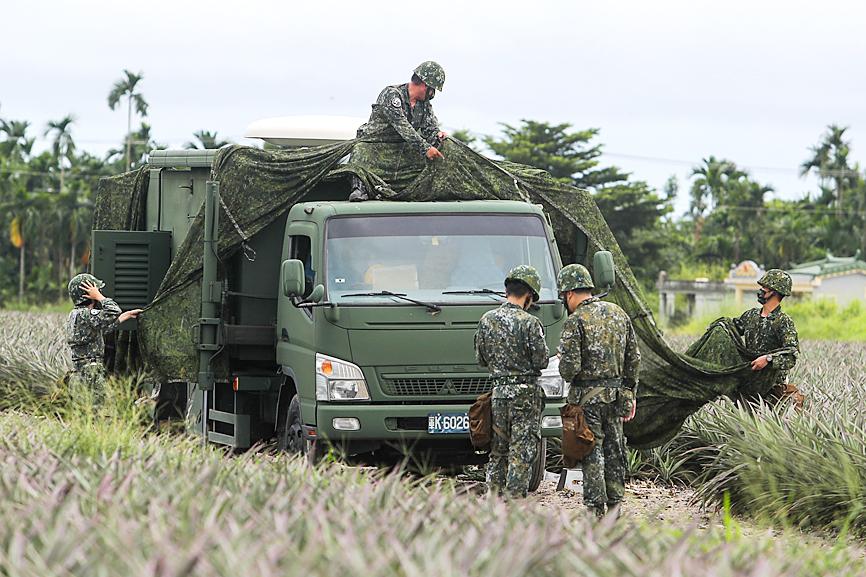Measures to bolster and maintain the willingness to fight is the key to extending the duration of mandatory terms of military service, which would in turn enhance international confidence in Taiwan’s self-defense capabilities, retired air force lieutenant general Chang Yen-ting (張延廷) said.
External threats have prompted Israel, Singapore, South Korea and other nations to mandate military service for one year or more, while Taiwan, despite the threat of the Chinese Communist Party (CCP), has only four months, Chang said.
Pundits have long called for the mandatory service period to be extended, and yet Minister of National Defense Chiu Kuo-cheng (邱國正) on Friday was only willing to say that the issue was being “seriously considered,” Chang said.

Photo: CNA
The issue of extending mandatory service is complicated and faces potential opposition, such as issues of generational injustice and election concerns, Chang said.
Extending the service period would do nothing if people have no will to fight, he said.
Even if the government were to extend the service period, it would not help to improve combat capabilities much, he said, citing a lack of mental preparedness.
Measures to bolster and maintain willingness among Taiwanese to fight would allay international concern about the nation’s self-defense capabilities, he said.
The government should extend the mandatory military service from four months to one year, and mandate that the policy would apply to people born after a certain year, he said.
Chang cited the example when the government said that Taiwanese born after 1994 would only have to serve four months, instead of one year.
A peace-time government must have the moral courage to enact policies to extend the mandatory service period, while the Ministry of National Defense should thoroughly review its training programs, logistics and issue new standards of military education, former National Defense University lecturer Holmes Liao (廖宏祥) said.
Without such changes, a move to extend the mandatory service period would be moot, as people would be wasting two years of their lives in a military without them, Liao said.
Any extension of the period must take into account projections of how many reservist forces Taiwan would have, he said.
An incremental increase in the service period should be implemented so the ministry can keep up with the changes, he said.

Chinese spouse and influencer Guan Guan’s (關關) residency permit has been revoked for repeatedly posting pro-China videos that threaten national security, the National Immigration Agency confirmed today. Guan Guan has said many controversial statements in her videos posted to Douyin (抖音), including “the red flag will soon be painted all over Taiwan” and “Taiwan is an inseparable part of China,” and expressing hope for expedited reunification. The agency last year received multiple reports alleging that Guan Guan had advocated for armed reunification. After verifying the reports, the agency last month issued a notice requiring her to appear and explain her actions. Guan

GIVE AND TAKE: Blood demand continues to rise each year, while fewer young donors are available due to the nation’s falling birthrate, a doctor said Blood donors can redeem points earned from donations to obtain limited edition Formosan black bear travel mugs, the Kaohsiung Blood Center said yesterday, as it announced a goal of stocking 20,000 units of blood prior to the Lunar New Year. The last month of the lunar year is National Blood Donation Month, when local centers seek to stockpile blood for use during the Lunar New Year holiday. The blood demand in southern Taiwan — including Tainan and Kaohsiung, as well as Chiayi, Pingtung, Penghu and Taitung counties — is about 2,000 units per day, the center said. The donation campaign aims to boost

The Kaohsiung Tourism Bureau audited six hotels in an effort to prevent price gouging ahead of Korean band BTS’ concert tour in the city scheduled for Nov. 19, 21 and 22 this year. The bureau on Friday said that the audits — conducted in response to allegations of unfair pricing posted on social media — found no wrongdoing. These establishments included the local branches of Chateau de Chine, Hotel Nikko, My Humble House, and Grand Hai Lai, it said, adding that the Consumer Protection Commission would have penalized price gougers had the accusations been substantiated. The bureau said the Tourism Development Act

The military yesterday said it has located the flight data recorder, or black box, of an F-16V jet that disappeared off eastern Taiwan earlier this month, and it would soon deploy a salvage team to try to retrieve it. Air Force Command Headquarters said that while it had pinned down the location of the black box, it was still searching for the aircraft’s sole pilot, air force Captain Hsin Po-yi (辛柏毅). Without providing details, the air force said it had located the black box days after detecting some intermittent signals and would now engage a team of professionals to retrieve it. The air